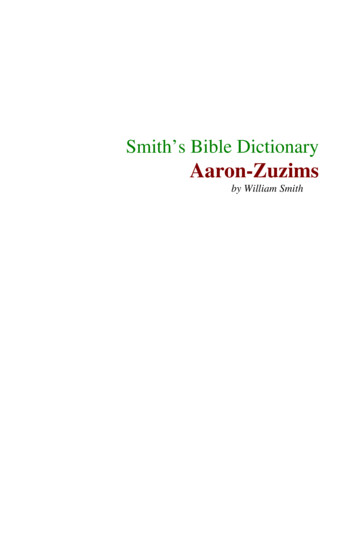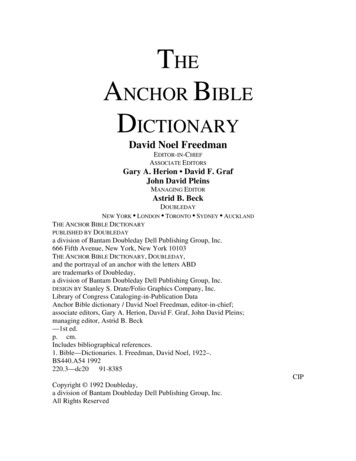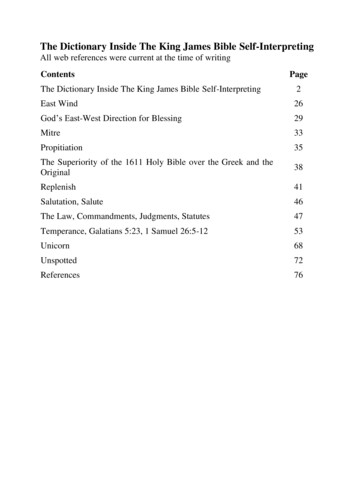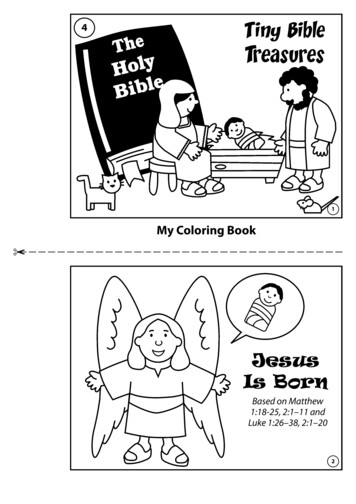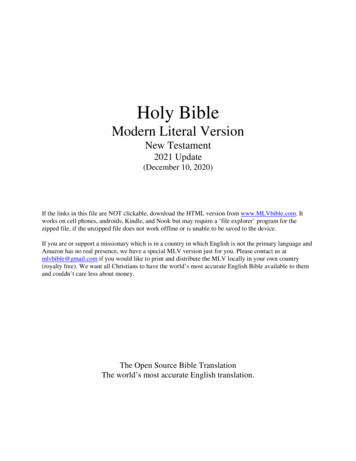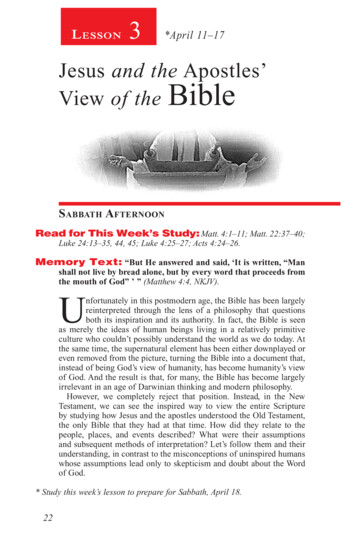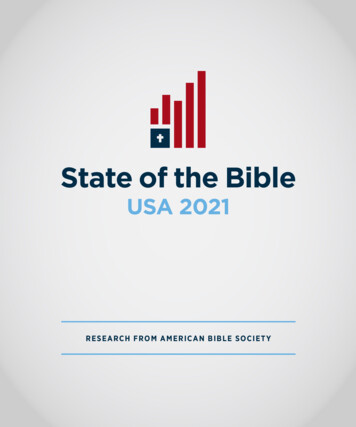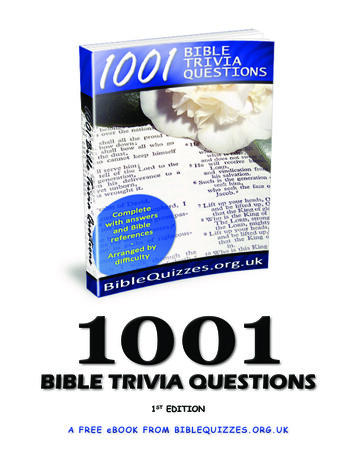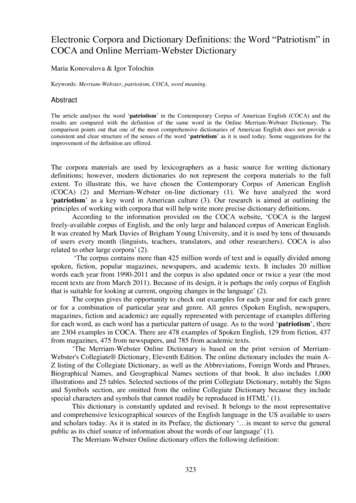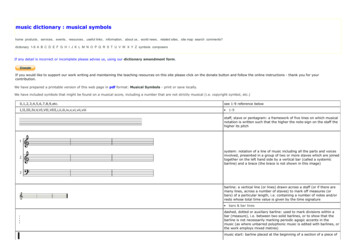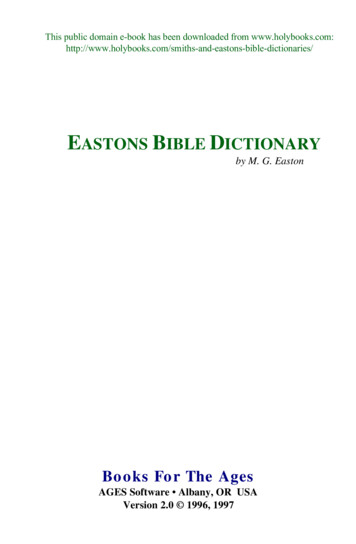
Transcription
This public domain e-book has been downloaded from and-eastons-bible-dictionaries/EASTONS BIBLE DICTIONARYby M. G. EastonB o o k s Fo r Th e A g e sAGES Software Albany, OR USAVersion 2.0 1996, 1997
EASTONSBIBLEDICTIONARYA Dictionary of Bible Termsby M.G. Easton M.A., D.D.,fromIllustrated Bible DictionaryThird Editionpublished byThomas Nelson, 1897.
A A Alpha, the first letter of the Greek alphabet, as Omega is the last.These letters occur in the text of Revelation 1:8,11; 21:6; 22:13, and arerepresented by “Alpha” and “Omega” respectively (omitted in R.V., 1:11).They mean “the first and last.” (Comp. Hebrews 12:2; Isaiah 41:4;44:6; Revelation 1:11,17; 2:8.) In the symbols of the earlyChristian Church these two letters are frequentlycombined with the cross or with Christ’s monogram todenote his divinity. AARON the eldest son of Amram and Jochebed, a daughter of Levi(Exodus 6:20). Some explain the name as meaning mountaineer, othersmountain of strength, illuminator. He was born in Egypt three years beforehis brother Moses, and a number of years after his sister Miriam (2:1,4;7:7). He married Elisheba, the daughter of Amminadab of the house ofJudah (6:23; 1 Chronicles 2:10), by whom he had four sons, Nadab andAbihu, Eleazar and Ithamar. When the time for the deliverance of Isaraelout of Egypt drew nigh, he was sent by God (Exodus 4:14,27-30) to meethis long-absent brother, that he might co-operate with him in all that theywere required to do in bringing about the Exodus. He was to be the“mouth” or “prophet” of Moses, i.e., was to speak for him, because hewas a man of a ready utterance (7:1,2,9,10,19). He was faithful to histrust, and stood by Moses in all his interviews with Pharaoh.When the ransomed tribes fought their first battle with Amalek inRephidim, Moses stood on a hill overlooking the scene of the conflict withthe rod of God in his outstretched hand. On this occasion he was attendedby Aaron and Hur, his sister’s husband, who held up his wearied hands tillJoshua and the chosen warriors of Israel gained the victory (17:8-13).Afterwards, when encamped before Sinai, and when Moses at thecommand of God ascended the mount to receive the tables of the law,Aaron and his two sons, Nadab and Abihu, along with seventy of theelders of Israel, were permitted to accompany him part of the way, and tobehold afar off the manifestation of the glory of Israel’s God (Exodus19:24; 24:9-11). While Moses remained on the mountain with God, Aaronreturned unto the people; and yielding through fear, or ignorance, or
instability of character, to their clamour, made unto them a golden calf, andset it up as an object of worship (Exodus 32:4; Psalm 106:19). On thereturn of Moses to the camp, Aaron was sternly rebuked by him for thepart he had acted in this matter; but he interceded for him before God, whoforgave his sin (Deuteronomy 9:20).On the mount, Moses received instructions regarding the system ofworship which was to be set up among the people; and in accordancetherewith Aaron and his sons were consecrated to the priest’s office(Leviticus 8; 9). Aaron, as high priest, held henceforth the prominent placeappertaining to that office.When Israel had reached Hazeroth, in “the wilderness of Paran,” Aaronjoined with his sister Miriam in murmuring against Moses, “because of theEthiopian woman whom he had married,” probably after the death ofZipporah. But the Lord vindicated his servant Moses, and punishedMiriam with leprosy (Numbers 12). Aaron acknowledged his own and hissister’s guilt, and at the intercession of Moses they were forgiven.Twenty years after this, when the children of Israel were encamped in thewilderness of Paran, Korah, Dathan, and Abiram conspired against Aaronand his sons; but a fearful judgment from God fell upon them, and theywere destroyed, and the next day thousands of the people also perished bya fierce pestilence, the ravages of which were only stayed by theinterposition of Aaron (Numbers 16). That there might be further evidenceof the divine appointment of Aaron to the priestly office, the chiefs of thetribes were each required to bring to Moses a rod bearing on it the name ofhis tribe. And these, along with the rod of Aaron for the tribe of Levi, werelaid up overnight in the tabernacle, and in the morning it was found thatwhile the other rods remained unchanged, that of Aaron “for the house ofLevi” budded, blossomed, and yielded almonds (Numbers 17:1-10). Thisrod was afterwards preserved in the tabernacle (Hebrews 9:4) as amemorial of the divine attestation of his appointment to the priesthood.Aaron was implicated in the sin of his brother at Meribah (Numbers20:8-13), and on that account was not permitted to enter the PromisedLand. When the tribes arrived at Mount Hor, “in the edge of the land ofEdom,” at the command of God Moses led Aaron and his son Eleazar tothe top of that mountain, in the sight of all the people. There he strippedAaron of his priestly vestments, and put them upon Eleazar; and there
Aaron died on the top of the mount, being 123 years old (Numbers20:23-29. Comp. Deuteronomy 10:6; 32:50), and was “gathered unto hispeople.” The people, “even all the house of Israel,” mourned for him thirtydays. Of Aaron’s sons two survived him, Eleazar, whose family held thehigh-priesthood till the time of Eli; and Ithamar, in whose family, beginningwith Eli, the high-priesthood was held till the time of Solomon. Aaron’sother two sons had been struck dead (Leviticus 10:1,2) for the daringimpiety of offering “strange fire” on the alter of incense.The Arabs still show with veneration the traditionary site of Aaron’s graveon one of the two summits of Mount Hor, which is marked by aMohammedan chapel. His name is mentioned in the Koran, and there arefound in the writings of the rabbins many fabulous stories regarding him.He was the first anointed priest. His descendants, “the house of Aaron,”constituted the priesthood in general. In the time of David they were verynumerous (1 Chronicles 12:27). The other branches of the tribe of Leviheld subordinate positions in connection with the sacred office. Aaron wasa type of Christ in his official character as the high priest. His priesthoodwas a “shadow of heavenly things,” and was intended to lead the people ofIsrael to look forward to the time when “another priest” would arise “afterthe order of Melchizedek” (Hebrews 6:20). (See MOSES.) AARONITES the descendants of Aaron, and therefore priests. Jehoiada,the father of Benaiah, led 3,700 Aaronites as “fighting men” to the supportof David at Hebron (1 Chronicles 12:27). Eleazar (Numbers 3:32), and at alater period Zadok (1 Chronicles 27:17), was their chief. ABADDON destruction, the Hebrew name (equivalent to the GreekApollyon, i.e., destroyer) of “the angel of the bottomless pit” (Revelation9:11). It is rendered “destruction” in Job 28:22; 31:12; 26:6; Proverbs15:11; 27:20. In the last three of these passages the Revised Versionretains the word “Abaddon.” We may regard this word as a personificationof the idea of destruction, or as sheol, the realm of the dead. ABAGTHA one of the seven eunuchs in Ahasuerus’s court (Esther 1:10;2:21). ABANA stony (Hebrews marg. “Amanah,” perennial), the chief river ofDamascus (2 Kings 5:12). Its modern name is Barada, the Chrysorrhoas, or“golden stream,” of the Greeks. It rises in a cleft of the Anti-Lebanon
range, about 23 miles north-west of Damascus, and after flowingsouthward for a little way parts into three smaller streams, the central oneflowing through Damascus, and the other two on each side of the city,diffusing beauty and fertility where otherwise there would be barrenness. ABARIM regions beyond; i.e., on the east of Jordan, a mountain, or rathera mountain-chain, over against Jericho, to the east and south-east of theDead Sea, in the land of Moab. From “the top of Pisgah”, i.e., MountNebo (q.v.), one of its summits, Moses surveyed the Promised Land(Deuteronomy 3:27; 32:49), and there he died (34:1,5). The Israelites hadone of their encampments in the mountains of Abarim (Numbers 33:47,48)after crossing the Arnon. ABBA This Syriac or Chaldee word is found three times in the NewTestament (Mark 14:36; Romans 8:15; Galatians 4:6), and in each case isfollowed by its Greek equivalent, which is translated “father.” It is a termexpressing warm affection and filial confidence. It has no perfect equivalentin our language. It has passed into European languages as an ecclesiasticalterm, “abbot.” ABDA servant. (1.) The father of Adoniram, whom Solomon set over thetribute (1 Kings 4:6); i.e., the forced labour (R.V., “levy”).(2.) A Levite of the family of Jeduthun (Nehemiah 11:17), also calledObadiah (1 Chronicles 9:16). ABDEEL servant of God, (Jeremiah 36:26), the father of Shelemiah. ABDI my servant. (1.) 1 Chronicles 6:44. (2.) 2 Chronicles 29:12. (3.)Ezra 10:26. ABDIEL servant of God, (1 Chronicles 5:15), a Gadite chief. ABDON servile. (1.) The son of Hillel, a Pirathonite, the tenth judge ofIsrael (Judges 12:13-15). He is probably the Bedan of 1 Samuel 12:11.(2.) The first-born of Gibeon of the tribe of Benjamin (1 Chronicles 8:30;9:36).(3.) The son of Micah, one of those whom Josiah sent to the prophetessHuldah to ascertain from her the meaning of the recently discovered bookof the law (2 Chronicles 34:20). He is called Achbor in 2 Kings 22:12.(4.) One of the “sons” of Shashak (1 Chronicles 8:23).
This is the name also of a Levitical town of the Gershonites, in the tribe ofAsher (Joshua 21:30; 1 Chronicles 6:74). The ruins of Abdeh, some 8miles north-east of Accho, probably mark its site. ABEDNEGO servant of Nego Nebo, the Chaldee name given to Azariah,one of Daniel’s three companions (Daniel 2:49). With Shadrach andMeshach, he was delivered from the burning fiery furnace (3:12-30). ABEL (Hebrews Hebhel), a breath, or vanity, the second son of Adamand Eve. He was put to death by his brother Cain (Genesis 4:1-16).Guided by the instruction of their father, the two brothers were trained inthe duty of worshipping God. “And in process of time” (marg. “at the endof days”, i.e., on the Sabbath) each of them offered up to God of thefirst-fruits of his labours. Cain, as a husbandman, offered the fruits of thefield; Abel, as a shepherd, of the firstlings of his flock. “The Lord hadrespect unto Abel and his offering; but unto Cain and his offering he hadnot respect” (Genesis 4:3-5). On this account Cain was angry with hisbrother, and formed the design of putting him to death; a design which heat length found an opportunity of carrying into effect (Genesis 4:8,9.Comp. 1 John 3:12). There are several references to Abel in the NewTestament. Our Saviour speaks of him as “righteous” (Matthew 23:35).“The blood of sprinkling” is said to speak “better things than that of Abel”(Hebrews 12:24); i.e., the blood of Jesus is the reality of which the bloodof the offering made by Abel was only the type. The comparison here isbetween the sacrifice offered by Christ and that offered by Abel, and notbetween the blood of Christ calling for mercy and the blood of themurdered Abel calling for vengeance, as has sometimes been supposed. Itis also said (Hebrews 11:4) that “Abel offered unto God a more excellentsacrifice than Cain.” This sacrifice was made “by faith;” this faith rested inGod, not only as the Creator and the God of providence, but especially inGod as the great Redeemer, whose sacrifice was typified by the sacrificeswhich, no doubt by the divine institution, were offered from the days ofAdam downward. On account of that “faith” which looked forward to thegreat atoning sacrifice, Abel’s offering was accepted of God. Cain’soffering had no such reference, and therefore was rejected. Abel was thefirst martyr, as he was the first of our race to die.Abel (Hebrews ‘abhel), lamentation (1 Samuel 6:18), the name given to thegreat stone in Joshua’s field whereon the ark was “set down.” The RevisedVersion, however, following the Targum and the LXX., reads in the
Hebrew text ’ebhen ( a stone), and accordingly translates “unto the greatstone, whereon they set down the ark.” This reading is to be preferred.Abel (Hebrews ‘abhel), a grassy place, a meadow. This word enters intothe composition of the following words:
ABEL-BETH-MAACHAH meadow of the house of Maachah, a city inthe north of Palestine, in the neighbourhood of Dan and Ijon, in the tribe ofNaphtali. It was a place of considerable strength and importance. It iscalled a “mother in Israel”, i.e., a metropolis (2 Samuel 20:19). It wasbesieged by Joab (2 Samuel 20:14), by Benhadad (1 Kings 15:20), and byTiglath-pileser (2 Kings 15:29) about B.C. 734. It is elsewhere calledAbel-maim, meadow of the waters, (2 Chronicles 16:4). Its site is occupiedby the modern Abil or Abil-el-kamh, on a rising ground to the east of thebrook Derdarah, which flows through the plain of Huleh into the Jordan,about 6 miles to the west-north-west of Daniel ABEL-CHERAMIM (Judges 11:33, R.V.; A. V., “plain of thevineyards”), a village of the Ammonites, whither Jephthah pursued theirforces. ABEL-MEHOLAH meadow of dancing, or the dancing-meadow, thebirth-place and residence of the prophet Elisha, not far from Beth-shean (1Kings 4:12), in the tribe of Issachar, near where the Wady el-Malehemerges into the valley of the Jordan, “the rich meadow-land whichextends about 4 miles south of Beth-shean; moist and luxuriant.” HereElisha was found at his plough by Elijah on his return up the Jordan valleyfrom Horeb (1 Kings 19:16). It is now called ‘Ain Helweh. ABEL-MIZRAIM meadow of Egypt, or mourning of Egypt, a place“beyond,” i.e., on the west of Jordan, at the “threshing-floor of Atad.”Here the Egyptians mourned seventy days for Jacob (Genesis 50:4-11). Itssite is unknown. ABEL-SHITTIM meadow of the acacias, frequently called simply“Shittim” (Numbers 25:1; Joshua 2:1; Micah 6:5), a place on the east ofJordan, in the plain of Moab
A Dictionary of Bible Terms by M.G. Easton M.A., D.D., from Illustrated Bible Dictionary Third Edition published by Thomas Nelson, 1897.

